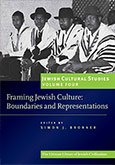Jewish Cultural Studies, Volume 3
Revisioning Ritual: Jewish Traditions in Transition
For Jewish cultural studies, the analysis of changes in ritual content, and of the responses of both participants and non-participants to those changes, is critical to illuminating what is Jewish about Jewishness. This volume shows ritual action to be key to the maintenance of identity and to the expression of world-view. Often overlooked as routine or dismissed as bizarre abnormality, ritual in its many forms, conflicts, and guises is shown to be a central strategy for embodying experience that is lived, imagined, and even negated.
More info
Often overlooked as routine or even dismissed as odd customs, ritual in its many guises demands attention as a central strategy for embodying experience. Like other groups, Jews rely on ritual to provide an inventory of social meanings and a context for negotiating the challenges of everyday life. Ritual for Jews has historically carried special meanings for conveying what is Jewish about Jewishness.
It is not enough, however, simply to document customs: for a full understanding of ritual and its meaning for participants we need to analyse how ritual expressions such as liturgies, holidays, life-cycle events—even political rallies—change in response to developments in the wider society, or are adapted to meet new needs. The innovative studies of adapted, invented, and evolving rituals presented in this volume, that include the Tunisian Jewish celebration of Se’udat Yitro, liturgical prayers for Israel Independence Day, shiva observance in an old-age home, transplanted Ethiopian Jewish wedding events, and same-sex marriage rituals. thus interpret the Jewish enactment of ritual and uses of tradition in everyday life against the background of modernity and community.
It is the complexities of ritual—the dynamics of negotiating the religious and the secular, the traditional and the modern, the social and the political, performance and practice—that form the core of the book. Together, the contributors show ritual action to be key to the maintenance of Jewish identity and to the expression of a distinctive world-view.
About the editor
Contributors
Simon J. Bronner, Alanna E. Cooper, Jean R. Freedman, Sander L. Gilman, Harvey E. Goldberg, Jillian Gould, Michael Hoberman, Agnieszka Jagodzińska, Shaul Kelner, Irit Koren, Gail Labovitz, Vanessa L. Ochs, Hagar Salamon, Rachel Sharaby, Nina S. Spiegel, Seth Ward
Contributor Information
Simon J. Bronner, Distinguished University Professor of American Studies and Folklore, Pennsylvania State University, Harrisburg
Alanna E. Cooper, cultural anthropologist
Jean R. Freedman, teacher of history and women’s studies, Montgomery College, Rockville, Maryland
Sander Gilman, Distinguished Professor of the Arts and Sciences and Director of the Psychoanalytic Studies Program, Emory University
Harvey E. Goldberg, Emeritus Sarah Allen Shaine Chair in Sociology and Anthropology, Hebrew University of Jerusalem
Jillian Gould, Assistant Professor, Department of Folklore, Memorial University of Newfoundland
Michael Hoberman, Associate Professor of English and Folklore, Fitchburg State College Agnieszka Jagodzińska, Assistant Professor, Department of Jewish Studies, University of Wrocław
Shaul Kelner, Assistant Professor of Sociology and Jewish Studies, Vanderbilt University
Irit Koren, (Ph.D. in gender studies, Bar-Ilan University); Visiting Aresty Scholar, Allen and Joan Bildner Center for the Study of Jewish Life, Rutgers University (2008–2009)
Gail Labovitz, Associate Professor of Rabbinics, American Jewish University
Vanessa L. Ochs, Associate Professor, Department of Religious Studies and Program in Jewish Studies, University of Virginia
Hagar Salamon, head, Jewish and Comparative Folklore program and the Africa Unit, Harry S. Truman Research Institute for the Advancement of Peace, Hebrew University of Jerusalem
Rachel Sharaby, lecturer in sociology, Academic College of Ashkelon and at the Interdisciplinary Social Sciences Department, Bar-Ilan University
Nina Spiegel, Schusterman Teaching Fellow in Jewish Studies, American University
Seth Ward, Academic Professional Lecturer in Religious Studies, University of Wyoming
Contents
Note on Transliteration
Introduction: Ritualizing Jewishness
SIMON J. BRONNER
PART I THE RITUAL YEAR
1 The Riddle of Se’udat Yitro (Jethro’s Feast): Interpreting a Celebration among Tunisia’s Jews
HARVEY E. GOLDBERG and HAGAR SALAMON
2 Ritual and History: The Order of Prayers for Israel Independence Day (Yom Ha’atsma’ut)
SETH WARD
3 The Masquerade of Ideas: The Purimshpil as Theatre of Conflict
JEAN R. FREEDMAN
4 Be Worthy of Your Heritage: Jews and Tradition at Two New England Boarding Schools
MICHAEL HOBERMAN
PART II REVISIONING WEDDINGS AND MARRIAGE
5 Engendering Halakhah: Rachel Adler’s Berit Ahuvim and the Quest to Create a Feminist Halakhic Praxis
GAIL LABOVITZ
6 Same-Sex Marriage Ceremonies in a Time of Coalescence
VANESSA L. OCHS
7 The Power of Discourse: Orthodox Women in Israel Negotiating Modernity and
Tradition in the Jewish Wedding
IRIT KOREN
8 Tradition in Intercultural Transition: Marriage Rituals in Ethiopia and Israel
RACHEL SHARABY
PART III REVISIONING MOURNING AND DEATH
9 Kaddish for Angels: Revisioning Funerary Rituals and Cemeteries in
Nineteenth-Century Jewish Warsaw
AGNIESZKA JAGODZIŃSKA
10 Rituals of Mourning among Central Asia’s Bukharan Jews: Remembering the
Past and Addressing the Present
ALANNA E. COOPER
11 Shiva as Creative Ritual in an Institutional Home
JILLIAN GOULD
PART IV RITUAL PERFORMANCE
12 Are You Just What You Eat? Ritual Slaughter and the Politics of National Identity
SANDER L. GILMAN
13 Social Movements and the Bureaucratization of Ritual Innovation: The Ritual
Cycle of the American Mobilization for Soviet Jewry
SHAUL KELNER
14 New Israeli Rituals: Inventing a Folk Dance Tradition
NINA S. SPIEGEL
Notes on Contributors
Index
Reviews
‘A worthy read for anyone interested in Jewish ritual.’
David Tesler, AJL Reviews
‘Makes a distinctive mark in the fields of Jewish studies and folklore studies . . . distinctly highlights perception in the practice of Jewish ritual, offering performance-oriented, ethnographically based perspectives on the relationships between individuals, their ritual practices, and their social environments . . . this volume’s emphasis on perception and lived experience in the study of Jewish ritual offers rich material for students, scholars, and general readers alike interested in the power of ritual to make change, and to respond to it. It is a leading contribution that refines and advances Jewish cultural study and the study of ritual practice.‘
Gabrielle A. Berlinger, Journal of Folklore Research



